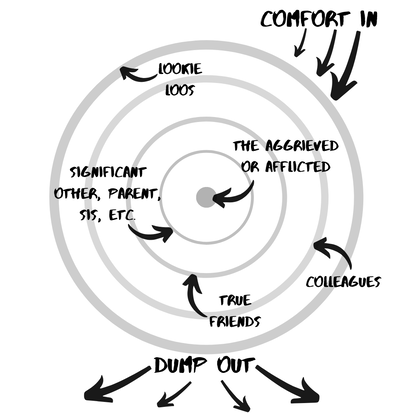|
By Abby Glaser I read a fantastic article this week addressing how to talk to someone experiencing crisis. I encourage you to read the whole article. It explains something called “Ring Theory”. The gist of it is that the person experiencing the crisis is the center of the ring. The next circle is the individuals closest to them, often spouses, partners and immediate family. Each ring moving out from the circle represents how close to the crisis people are. The person in the center of the ring can say anything they want. For each corresponding ring, the individuals can share honestly with anyone outside their personal ring but not inside. For those in a “smaller ring” than ourselves, our role is to listen and support. What the article didn’t dive into much was “How do I do that?”
Let’s start with a few tips of what NOT to say to someone experiencing crisis!
So what should you do to support and listen?
These are just some starting points on how to help someone dealing with a crisis but hopefully they are a good first step in loving and supporting someone struggling!
5 Comments
Nancy Patton
12/11/2019 10:17:07 am
Very good advise.
Reply
Malcolm Davis
2/11/2020 10:57:46 am
Thank you for this post! This is very good information (Tools) to have to compassionately communicate with people in a crisis.
Reply
Leah Chaffee
2/12/2020 10:08:03 am
This is a great refresher to think about daily, as we work with those who are struggling in different ways. I am thankful for the articles shared by you.
Reply
Mrs Erika Weston
12/9/2023 04:54:05 pm
Thank you. This is something I have really needed to know as I am sure I have not been as supportive as I would have hoped to have been.
Reply
J Arlove
4/5/2024 01:46:43 am
This has helped/this is something I have really needed to know more about.
Reply
Your comment will be posted after it is approved.
Leave a Reply. |
HostsDr. David Marine and Theresa Mabry are Co-Directors of Encompass since June 1, 2024. TOPICS
All
Archives
July 2024
|
FIND IT QUICKLY |
STAY CONNECTEDOFFICE HOURSMON 9a-2p
TUE 9a-2p WED 9a-2p THU 9a-2p Other hours by appointment VISIT US616 N. Limestone St. | Springfield, OH
|
Funding is provided by Clark County Job and Family Services, Charles L. Shor Foundation, Nehemiah Foundation, Springfield Foundation, Turner Foundation, and private donations and fees.
Program content is the sole responsibility of Encompass Connection Center and does not necessarily represent the views of the funders.
Encompass Connection Center services are provided to all eligible persons on a non-discriminatory basis. Encompass Connection Center complies with all applicable laws and regulations concerning discrimination does not discriminate on the basis of the potential participant's race, gender, gender orientation, age, disability or religion.
Registered 501(c)(3). EIN: 37-1485217
Program content is the sole responsibility of Encompass Connection Center and does not necessarily represent the views of the funders.
Encompass Connection Center services are provided to all eligible persons on a non-discriminatory basis. Encompass Connection Center complies with all applicable laws and regulations concerning discrimination does not discriminate on the basis of the potential participant's race, gender, gender orientation, age, disability or religion.
Registered 501(c)(3). EIN: 37-1485217



